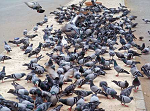
Flea Management - Lime a Natural Remedy
 In the days of the world wide web anyone can be an expert. Type in a few key words and up come a multitude of references. But beware…. are these references valid or is it simply another way of perpetuating myths via apparent authoritative sites.
In the days of the world wide web anyone can be an expert. Type in a few key words and up come a multitude of references. But beware…. are these references valid or is it simply another way of perpetuating myths via apparent authoritative sites.
For at least the last 25 years, even before ‘www.’, people have been spreading agricultural lime over soil, especially in sub-floors, to control fleas. It is claimed to smother eggs and dehydrate or desiccate fleas. Its effectiveness is doubtful considering the number of times pest managers are asked to control fleas where lime has been spread.
Pest Management In Food Premises
 Nowhere else is pest management more important than in a food premises. The potential of spreading food borne illnesses increases as hygiene standards lower and pest activity increases.
Nowhere else is pest management more important than in a food premises. The potential of spreading food borne illnesses increases as hygiene standards lower and pest activity increases.
All local governments in Australia undertake health inspections of food premises. Until 2010 only NSW published premises that were issued Penalty Notices or Prosecutions against the Food Regulations. That is all about to change. During 2010 most States announced the development of a 'scores on doors' policy for all food premises.
Bird Netting
 Urban bird populations have increased markedly in recent years, adding to the already significant problem of feral pigeons in and around public and retail buildings, houses and offices, warehouses and factories, bridges and monuments, sports andentertainment facilities, and transport hubs. Although starling populations which caused serious problems in the past have declined markedly over the last 30 years, they can still be problematic in some situations. House sparrows and other small birds can also cause particular difficulties for food manufacturers, processors and retailers.
Urban bird populations have increased markedly in recent years, adding to the already significant problem of feral pigeons in and around public and retail buildings, houses and offices, warehouses and factories, bridges and monuments, sports andentertainment facilities, and transport hubs. Although starling populations which caused serious problems in the past have declined markedly over the last 30 years, they can still be problematic in some situations. House sparrows and other small birds can also cause particular difficulties for food manufacturers, processors and retailers.
Using A Black Light For Rodent Inspections
A rodent inspection must aim to locate any signs of infestation and then identify the species, determine the extent of the infestation, locate potential harbourages and entry points and then use this information to plan a treatment program.